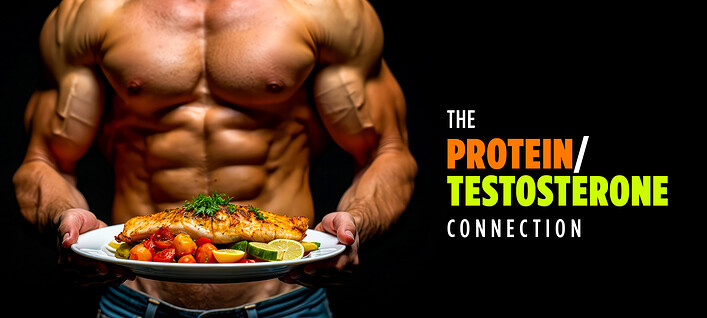by Chris Shugart
Some people say that high-protein diets lower testosterone. Do they? Here's the real science.
You've heard all the myths about the supposed dangers of high-protein diets: they wreck your kidneys, leach calcium from bones, shorten your lifespan, and your body can't even absorb more than 30 grams per meal. Every single one of those has been thoroughly debunked, and only your blue-haired vegetarian cousin still believes them.
But now the anti-protein brigade has a new one: High-protein diets lower your testosterone.
Is it true? Let's look at the actual science.
The Protein Study
The "protein lowers testosterone" idea comes from a recent meta-analysis (Whittaker, 2023). This study of studies examined all research related to protein intake and testosterone levels. The researchers wanted to see if high-protein diets affected T and clarify what "high protein" actually means.
Here's the short answer: Very high protein intakes do seem to lower testosterone. It's roughly a 145 ng/dL drop (5 nmol/L).
Don't panic just yet. The devil is in the details. Only three short-term studies found this drop, and all involved super-high protein intakes that most pro-bodybuilders don't even consume: more than 1.54 grams of protein per pound of body weight per day.
For a 150-pound man, that's about 230 grams per day. It's more than 275 grams daily for a 180-pound man, and over 310 grams for a 200-pound man.
The researchers think this may be caused by a short-term adaptation to help clear nitrogen. The body may lower testosterone (and raise cortisol) to help process excess nitrogen through the urea cycle. But whether it's harmful long-term is unknown. Most studies only lasted 10 days.
The researchers found no testosterone drop with normal protein recommendations for lifters and athletes, like eating 1 gram per pound of body weight daily.
How to Use This Info
First, you can tell your blue-haired cousin that high-protein diets do not lower testosterone, but extremely high-protein diets might, at least in the short term. The classic guideline – eat about a gram of protein per pound of body weight – does not lower testosterone levels.
Most people, even lifters, have a hard time even hitting those protein goals. The average man consumes only about 100 grams per day. But as the researchers point out in the meta-analysis, a normal high-protein diet only leads to increased satiety, fat loss, and preservation of lean mass during caloric deficits.
If you're not hitting your 1 g/lb BW goal, just add a protein shake or two per day. Two scoops of Metabolic Drive (Buy at Amazon) contain 42 grams of protein, a blend of whey protein isolate and micellar casein for sustained metabolic enhancement.
Prefer to chew your protein instead of drinking it? Try these Metabolic Drive recipe ideas:
Note: If you like protein powder recipes, check out this Reddit sub.
Reference
- Whittaker, Joseph. "High-Protein Diets and Testosterone. Nutrition and Health, vol. 29, no. 2, June 2023, pp. 185–191. SAGE Publications


